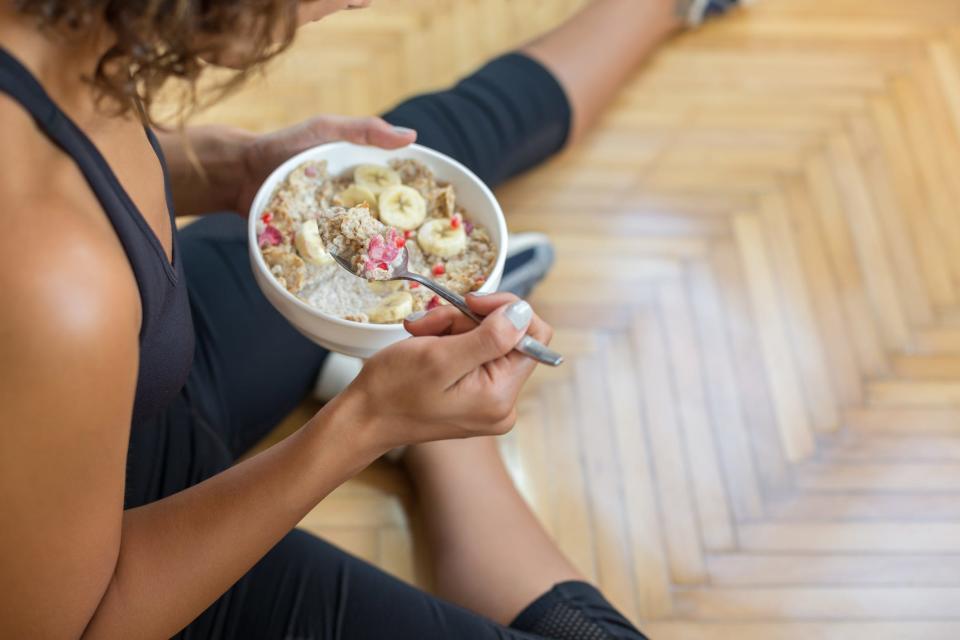A dietitian shares 5 warning signs that you're not eating enough to hit your fitness, energy, and weight goals

Too many health-conscious people aren't eating enough to support their exercise, a dietitian said.
Undereating can lead to fatigue, trouble sleeping, higher chance of injury, and health risks.
Don't be afraid to try eating more for a few weeks to see how you feel, even if you want to lose weight.
A common diet mistake could be stalling your workout gains and interrupting your energy outside the gym, according to a dietitian.
Brittany Werner, a registered dietitian nutritionist (RDN) and director at nutrition coaching company Working Against Gravity, said she frequently sees ambitious, health-conscious people who are under-eating. It's especially prevalent among women, who may have more pressure to look a certain way or maintain a certain weight.
But cutting calories too low can do more harm than good.
If you exercise regularly, it's crucial to get enough nutrients to help your body keep up, even if you're more of a weekend warrior than an elite athlete.
"If you are looking for performance, don't be afraid to give yourself enough fuel to allow yourself to reach your full potential. Especially for women. We deserve that," Werner told Business Insider.
Signs you aren't eating enough include trouble sleeping, changes in mood, and fatigue piling up.
If you notice any of these red flags of under-eating, it's a good bet that eating more (especially more nutrient-dense foods) could lead to better results for both exercise and your overall routine.
"So much of our society is centered around diet as a restriction," she said. "Nutrition can be about living a better life, not just looking better in a pair of pants."
Fatigue is an early warning sign that you aren't eating enough
If you're tired all the time, your body may be trying to tell you it needs more food, according to Werner.
"One of the first things we look at is fatigue and low energy. It can be hard to pinpoint that," she said.
While low energy can be caused by a lot of factors, feeling run down is a good reason to check in on your diet and increase your calories a bit to see if that helps.
"If fatigue is piling up, give yourself more food and see how you feel for a week," Werner said.
Poor sleep can be a sign of a bad diet
Another warning sign that your diet isn't working for you is trouble sleeping, according to Werner. If you're hungry or undernourished, it can make it difficult to fall asleep or stay asleep, which in turn can disrupt your appetite and energy the next day.
Sleep quality is one of the first things to go if your diet is too restrictive, so don't be afraid to eat a little more if hunger is keeping you up at night, Werner said.
Being constantly injured or sore may also mean you're lacking nutrients
If your muscles ache for days after a workout, you might not be giving your body the fuel to recover properly.
Werner said getting enough calories, and particularly the right balance of nutrients is essential to building and maintaining muscle.
"The vast majority of us are not eating enough protein," Werner said.
Eating more may help you lose weight too, if that's a goal, since getting enough protein can help ensure you're burning fat instead of losing muscle.
A bad mood can signal you need to eat more
Being hangry is a real thing, and can be a valuable cue to rethink your nutrition.
Werner said many people end up under-eating because they're following a cookie-cutter diet plan, often for weight loss, that doesn't account for their unique needs.
"Because of diet culture, we automatically think of restriction and removing things and being smaller. That's not what we need to be doing," she said.
Instead of going all-in a strict diet, Werner recommends adding one or two healthy habits at a time, like eating an extra serving of veggies each meal or drinking more water.
"Once those are like clockwork for you, you can start to add more habits and layer those on top," she said.
Missing or irregular periods are a serious sign of under-eating
For women, one of the major signs you're under-eating is a loss of your regular menstrual period.
Loss of periods is a big problem among women athletes, particularly in sports like running. It can signal serious issues, potentially leading to low bone density (risking breaks) and long-term problems with hormones and fertility.
"Women should not be missing a cycle, so restriction to the point of missing it is a big problem," Werner said.
Read the original article on Business Insider

 Yahoo Finance
Yahoo Finance 